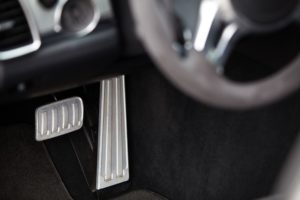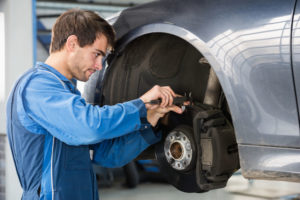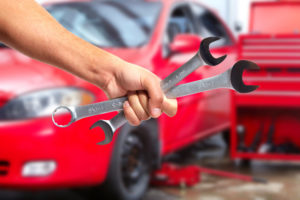
Ensure that your brake pedals are working by having them serviced every 50k miles!
The last thing anybody wants when they’re taking a leisurely cruise down the roads is for your music jam to be interrupted in sudden panic by faulty breaks! It’s not surprising that faulty breaks can come at inopportune times and catch us off-guard, they can often be brushed aside as an area for concern for more well-known issues in our cars like flat tires or a faulty A/C. Thankfully, it’s rare that you’ll suddenly go careening into the distance without warning, breaks more often than not provide the driver with telltale signs that they are wearing down. Suffice it to say, if you are experiencing problems with your breaks, it might be best to rely on auto service professionals for brake repairs. Consider these brake repair questions surrounding what goes behind the scenes when your breaks wear down and what measures to take if they need replacement.
What happens if your brake pads wear out?
It’s important to know how your brake pads wearing out can actually affect other systems and heighten the chances of additional repairs and replacements. Essentially, when you are stepping on the brakes, the brake pads press against the rotor and generates friction which slows your car down until a full stop is made. Heat distribution is produced evenly when your breaks are installed and used properly. However, not all cases will be peachy keen. Uneven wear may occur when pressures are being applied in uneven areas when there are uneven or loose connecting parts.
When brake pads wear down to less than a quarter of an inch, you can expect the rotor to become affected with damages as well. Brake pads essentially cover metal clamps, aka calipers, and when they become exposed from their covers they will grind against your rotor which is also made from metal. Friction between two metal objects creates much higher heat levels which can, in turn, cause warping or breaks on your rotor. They can also potentially overheat other connective parts in your car in the process. That’s because a lack of brake pads will cause uneven dispersion of heat and cause the whole breaking system to eventually overheat and fail as a result. Your brake calipers, in particular, may deteriorate and the pistons that push the calipers into position may pop out too.
Brake Repair Costs

Entrust a professional mechanic in examining your vehicle’s brake system!
Brake repair costs can range from $100 to $300 (including labor) per axle with an overall average of $150 per axle. If you have additional damages, such as needing to resurface rotors, then that cost could have up to $289 added to the total. With caliper replacements, you can expect to pay up to $500 as well. For all parts, it’s important to know that costs will differ in a range in accordance with your car type or model. (BMW service shop) Although there are brake repair tools that can aide in DIY replacement, it’s recommended to entrust your service repairs to your local brake repair shops as improper installation can be more of a detriment without an experienced professional’s assistance. (Inglewood, CA transmission service)
How do I know if my brake pads are worn out?
When your brake pads are in the process of wearing out, you’ll probably hear a squealing or screeching noise when you release the brake pedal. Additionally, while you’re breaking you’ll most likely hear a grinding or rumbling sound. In turn, a metal tab that’s fastened to the brake pads will alert drivers when pads have thinned down by causing a squealing sound when it rubs against the rotors as brakes are being applied. If this is the case, you’ll need to replace the breaks and in some cases the rotor as well. When your brake pads are thinning out, the metal on metal friction of the caliper in contact with the rotor can cause a pulsing sensation to your braking and also affect the steering wheel causing it to vibrate.
What causes brake pads to wear quickly?
There are many in-depth reasons and scenarios that can affect damages to your brake pads and cause it to wear faster than normal. In a nutshell, the main issue that seems to repeat in forums are the effects caused by improper initial installations.
How often do brake pads need replacing?
It is recommended that brake pads be serviced or replaced every 50k miles, keep in mind that your driving habits can affect how long parts are intended to last.
Which brand of brake pads is the best?

Contact your local repair shop for assistance with brake repairs today!
Ideal brake pad brands can ultimately differ in accordance with the type, make and model of the car that you have. However, the ones that are most popularly used in alphabetical order are ACDelco, Akebono, Bosch, Brembo, EBC Brakes, Hawk, StopTech, Raybestos and Wagner. If you have any questions regarding which brakes are right for your vehicle, call your local repair shop for assistance!
For brake repair in Inglewood, CA call __PHONE__ with L.A. NTX Transmissions!
